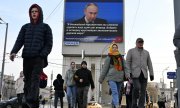What did Putin say in his State of the Nation speech?
In his State of the Nation address on Thursday, Putin sent warnings of a nuclear war to the West and made promises to the Russian people. Two weeks before the Russian presidential election, he held out the prospect of a support programme for families, investments in the healthcare sector and an increase in the minimum wage. But he failed to impress commentators with his promises.
Abstract and empty of meaning
Putin said nothing new, says political scientist Volodymyr Fessenko in NV:
“This was Putin's longest and most meaningless message since he took power almost a quarter of a century ago. There is hardly any politically significant content worth quoting or seriously analysing. ... If you strip Putin's message of all its verbosity, the war is his most important election promise. A special operation without end or limits. ... Once again there were threats to the West but at the same time an appeal to the Americans to be open to negotiation on strategic issues. But we have seen all this before, and in a more concrete form, not as abstract as this time.”
No mention of war and peace
The Moscow Times notes the absence of statements on Russia's real problems:
“Putin didn't say a word about whether he intends to keep the budget balanced. He also said nothing about the 'election' or the far more urgent question of the future of the war. There were no hints about peace terms, nothing about the possibility or impossibility of a new mobilisation, and even less about the situation on the front. ... In fact, only a few minutes of the long speech were devoted to military issues. Putin thus retains complete freedom of action to wage the war for as long as he wants - or to end it at any time on terms which he doesn't consider necessary to specify in advance.”
A simulation of peaceful times
The Kremlin leader has thrown sand in the eyes of a war-weary society, writes political scientist Abbas Galliamov in a Facebook post:
“The dominance of peaceful topics over military ones was striking. This is clear evidence of the real problems in the country. Russia doesn't want to fight, it wants to forget the war like a nightmare - and Putin is playing on this. ... The president prefers to talk about the design of public spaces in Russia's cities rather than about Ukraine. But we should be aware that the election will soon be over, and with it, the time for populism.”
Loyalty as a means for social advancement
The Russian president also made great promises to the troops, political researcher Igor Gretskiy observes in Eesti Päevaleht:
“Soon we will see people who fought in the war being appointed to high-ranking positions such as governor, chair of a state company or member of the State Duma. So for the Russians, the war against Ukraine is not just another opportunity to demonstrate their inferiority complex and chauvinism. For those who show unflinching ideological and political loyalty, the war could become a fast track to social advancement.”

